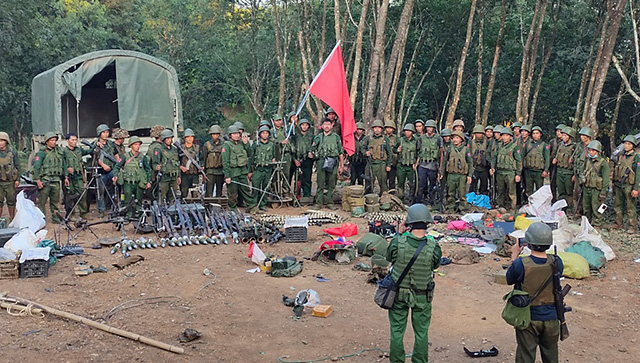In recent weeks, Myanmar has witnessed a significant shift in the balance of power as rebel groups gain ground against the ruling junta. The ongoing conflict has prompted neighbouring India to reassess its approach to the crisis advocating for a return to democracy in Myanmar.
A clear message from India A crucial development occurred when a delegation from Myanmar visited New Delhi engaging in discussions with Indian diplomats. The central message conveyed by India was unequivocal – a strong call for a transition towards a federal democracy in Myanmar. The official statement issued by the Indian Ministry of External Affairs reiterated India’s support for Myanmar’s democratic transition. India’s stance, though straightforward, also marks a subtle acknowledgment of a recalibration in its approach. In the aftermath of the coup two years ago, when the elected leader Aung San Suu Kyi lost power, India demonstrated patience and engaged with the coup leaders. This strategic decision was driven by India’s significant border proximity to Myanmar and its substantial strategic investments in the region. Rebel advances and junta’s losses However, with the junta losing control of military bases to rebel forces, India appears to be preparing for a potential future without the generals. The rebels have gained control over more than 200 military bases, confiscated significant quantities of weapons and now oversee crucial trade routes including the vital Chinshwehaw checkpoint near China’s Yunnan province. This strategic location is essential for the flow of goods between Myanmar and China with goods worth $1.8 billion sent to China via land borders from April to September. The impact of the rebel offensive extends beyond the military domain, affecting Myanmar’s economy. Furthermore, the junta faces internal challenges with reports of soldiers defecting and joining the rebels. This internal discord has weakened the military’s manpower, a critical element for maintaining authority and enforcing decisions. Signs of junta’s weakening grip An assessment revealed that over several months, Myanmar’s military lost 21,000 service members due to factors such as casualties, desertions and defections. Recent videos released by rebel forces depict soldiers surrendering indicating a growing discontent within the military ranks. India has even returned over 70 soldiers who attempted to cross into its territory after rebels took over their posts. As the junta grapples with losses on multiple fronts including territorial control, trade routes and personnel, there are signs of an internal crisis. The junta chief’s outreach for a political solution suggests a desire for negotiation, but the rebels, currently holding the upper hand, may not be inclined to relent easily. India, with a 1,600-kilometre-long border with Myanmar, faces the risk of the conflict spilling over. Uncertainty looms over Indian investments such as the Kaladan Transport Project and the India-Myanmar-Thailand Highway, both critical for regional connectivity. India, having invested nearly $2 billion in various development projects in Myanmar urgently needs stability in the region to unlock the full potential of these initiatives. In light of these developments, it is evident that New Delhi will not remain a passive observer. The evolving situation in Myanmar has compelled India to reassess its position emphasising the importance of stability and democratic governance in its neighbouring nation. Views expressed in the above piece are personal and solely that of the author. They do not necessarily reflect Firstpost’s views. Read all the Latest News , Trending News , Cricket News , Bollywood News , India News and Entertainment News here. Follow us on Facebook, Twitter and Instagram.


)

)
)
)
)
)
)
)
)



